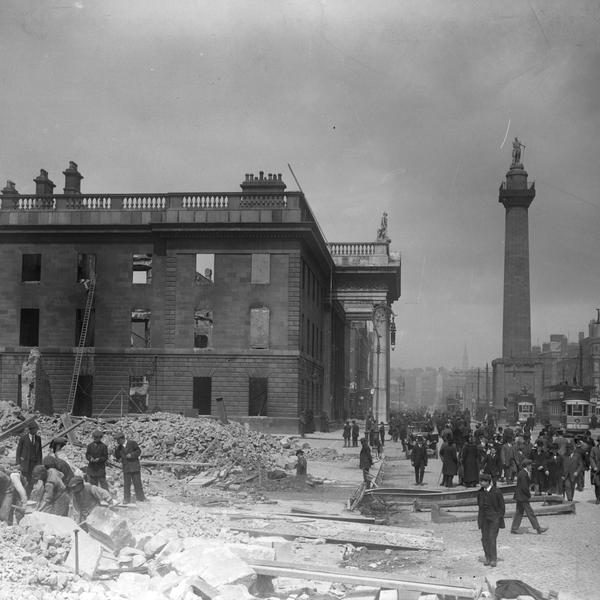
Why We Remember Easter 1916 - A Message From The Red Network
17 April 2025
“The day has passed for patching up the capitalist system; it must go!” James Connolly.
This Easter weekend as we celebrate those who fought for Irish freedom in 1916 and beyond throughout Ireland’s revolutionary period, it is vital that we remember those who fought for working class emancipation.
Freedom for a nation is nothing without class struggle, without working class emancipation from capitalism. We have more in common here in Ireland with workers in Cape Town or São Paulo than we do with bankers from Blackrock.
Just wrapping the green flag around us is no use and was often a tactic used by those who stole our revolution. We need to fight for a socialist Ireland, a Workers Republic, as envisioned by James Connolly 109 years ago.
Connolly’s writings are just as relevant today as they were during his lifetime.
He fought not only for national liberation, to break from the British Empire, but for unity of the working class won in a workers’ revolution. A combined strategy - to strike a blow at the biggest empire in the world while fighting for socialism was key to realising his vision of a United Ireland.
An Ireland won through mass strikes and protests, through worker occupations and risings, would have been very different to the Ireland won through negotiation with the British Empire and beholden to the Irish rich.
As laid out below, when class struggle and socialism are pushed aside for nationalism, the working class suffer the consequences.
After Easter week and the execution of 16 rebel leaders, the Labour movement was at a low ebb. The new leadership, headed by William O’Brien, chose to step aside for the sake of the Irish rich. They let them take the lead.
“Labour must wait” was a fatalistic blow to the Irish working class but workers weren’t deterred, our class still fought. In the aftermath of the Rising, and taking inspiration from the Russian Revolution in 1917, workers around the country, including dockers and rail workers, led general strikes against conscription, refusing to handle British goods and arms.
Workers around the country took over their factories, farms, towns and, in the case of the Limerick Soviet, a whole city! Ultimately, workers were failed by their leaders - people without the strength of character, or class politics of James Connolly.
Union bureaucrats and Labour politicians have been the same for over a century.
The Tan war, sparked by Sinn Féin refusing to take seats in Westminster and then setting up a Republican parliament in Dublin, eventually brought the rebels and the Empire around the table for peace talks.
The compromise for peace was the Anglo Irish Treaty - “freedom to achieve freedom”, meaning a disgusting partition of the island with a reactionary Protestant Orange statelet in Ulster and an equally reactionary Catholic Free State in the South.
The Free State would have British dominion status but would still be part of the Empire. Failing to make class struggle central to Irish freedom, Connolly’s prophetic words described what would happen perfectly:
“The betrayal of the national democracy of Industrial Ulster, would mean a carnival of reaction both North and South, would set back the wheels of progress, would destroy the oncoming unity of the Irish labour movement and paralyse all advanced movements while it lasted.”
The fallout from partition lead to a split in the Republican movement within Sinn Féin and to a bitter civil war. The precursors to Fine Gael, Pro-Treaty Sinn Féin, which became Cumann na nGaedheal in 1923, were led by conservative rebels like the wealthy W.T. Cosgrave.
They became the ruling party of the new Free State parliament in Dublin.
The armed wing, the Pro-Treaty IRA (becoming Óglach na hÉireann, the Free State Army after partition), headed by Michael Collins before his assassination in 1922, were armed by the British establishment.
Anti-Treaty Sinn Féin (which later became Fianna Fáil in 1932) and the Anti-Treaty IRA, led by Éamonn de Valera, took exception, not to partition itself, but to the Oath of the British King in parliament.
Thus, the most conservative Irish revolutionaries, drawn from the ranks of the boss class, began their counterrevolution in the South while the Orange state in the North began oppressing Catholics with the full support of the Westminster- a carnival of reaction played out in real life.
The Irish working class was betrayed again.
The new Free State, over a generation, became a defacto Catholic theocracy with Bishops, priests and nuns given control of schools and hospitals. In lieu of a social welfare state, Catholic charities were set up and given the job of “caring” for the poor. This was a deliberate move by the Free State to pass off the responsibilities of it’s population to the Church and nullify workers dissent while keeping poor people down.
As readers are well aware, the 26 county Free State, which declared a republic in 1949, initiated a campaign of terror on poor people, women, the disabled and minorities.
The horrors of the Magdalene laundries, industrial schools and Mother and Baby homes are well known and many of the victims of this brutal regime still live with the scars, mental and physical. The last institution of it’s kind didn’t close until 1996!
James Connolly was a visionary and knew that the fight for national liberation without socialistm would lead us to a divided island where the rich get richer while workers and the poor had to fight for scraps.
Irish capitalist today are no different from their English counterparts of the early 20th century. As Connolly explained:
“If you remove the English army tomorrow and hoist the green flag over Dublin Castle, unless you set about the organization of the Socialist Republic your efforts would be in vain. England would still rule you. She would rule you through her capitalists, through her landlords, through her financiers, through the whole array of commercial and individualist institutions she has planted in this country and watered with the tears of our mothers and the blood of our martyrs.”
But it’s not just British capital or US capital that feasts on the workers of Ireland - our own cruel bilionaire and millionaire class have Fianna Fáil and Fine Gael in their pockets.
The lesson from all this, as we honour Ireland’s revolutionary dead at Easter, is to never abandon the class struggle. The road to reformism is littered with the broken dreams of the working class and the broken promises of those who said they had our best intentions at heart.
The 32 County Socialist Republic won’t be handed down from above, it must be fought for. At the Red Network we are not here to conform to the system, we’re here to organise workers to smash the capitalist system once and for all.
You should join us.
 RED NETWORK
RED NETWORK